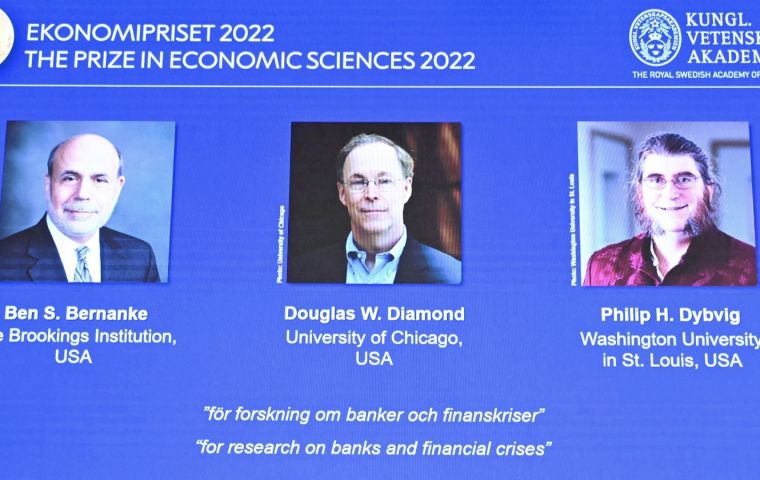MercoPress. South Atlantic News Agency
Nobel Economics Prize split among 3 US scholars
 Banks play a key role in economic recessions. Preventing banking crises might prove pivotal in avoiding these unwanted results, the Swedish Academy argued
Banks play a key role in economic recessions. Preventing banking crises might prove pivotal in avoiding these unwanted results, the Swedish Academy argued The Nobel Prize in Economics was awarded to Ben S. Bernanke, Douglas W. Diamond, and Philip H. Dybvig of the United States “for their research on banks and financial crises,” it was announced in Stockholm Monday.
Their findings are instrumental in preventing these episodes from developing into long-term recessions.
“Modern banking research clarifies why we have banks, how to make them less vulnerable in crises and how bank collapses exacerbate financial crises. The foundations of this research were laid by Ben Bernanke, Douglas Diamond, and Philip Dybvig in the early 1980s. Their analyses have been of great practical importance in regulating financial markets and dealing with financial crises,” the jury noted.
It also explained that the winners' work has been crucial to subsequent research “that has improved our understanding of banks, banking regulation, banking crises and how financial crises should be managed.”
Their winning study deals with reducing “the risk of financial crises turning into long-term recessions with serious consequences for society, which is of the greatest benefit to us all.”
Unlike the other prizes, the economics one was not established in Alfred Nobel's 1895 will, but by the Swedish central bank in his memory. The first winner was selected in 1969. Like the other awards, it consists of 10 million Swedish crowns (around US$ 900,000). In 1895 Alfred Nobel bequeathed in his will the majority of his estate to create five prizes (Chemistry, Physics, and Physiology/Medicine plus one in literature and one for peace), recognizing “those, who during the preceding year, have conferred the greatest benefit to humankind.”
The awarding committee explained that Bernanke analyzed the Great Depression of the 1930s and showed how bank runs were a decisive factor in making the crisis so deep and prolonged. Using historical sources and statistical methods, Bernanke's analysis showed which factors were important in the fall of gross domestic product. He found that factors directly related to bank failures contributed most to the downturn.
Diamond and Dybvig developed theoretical models that explain why banks exist, how their role in society makes them vulnerable to rumors of their imminent collapse, and how society can lessen this vulnerability while presenting a solution to this issue in the form of deposit insurance by the government. Diamond also underlined that banks play a socially important role by linking savers and borrowers.
“The laureates' insights have improved our ability to avoid both severe crises and costly bailouts,” said Tore Ellingsen, Chairman of the Economic Science Prize Committee.
Of all the Nobel Prizes, the economics prize has awarded the fewest women (only two) since it was first awarded in 1969 - Elinor Ostrom in 2009 and Esther Duflo in 2019. It was established in 1968 by the Sveriges Riksbank and it has been awarded 54 times to 92 laureates.




Top Comments
Disclaimer & comment rulesCommenting for this story is now closed.
If you have a Facebook account, become a fan and comment on our Facebook Page!